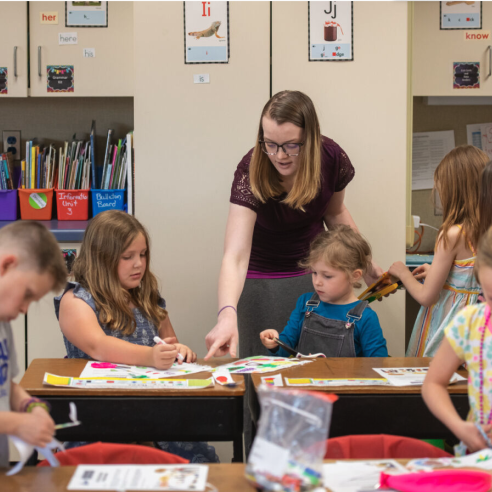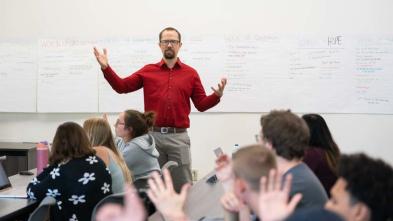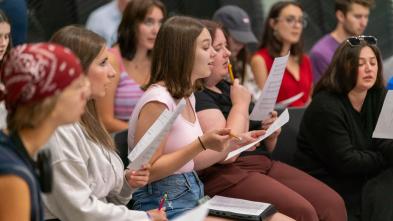
Adaptive Music
UWEC's adaptive music certificate is an add-on certificate program for music education majors looking to become more informed and inclusive in their teaching. The certificate encompasses the requirements for the Department of Public Instruction (DPI) certification in adaptive education, certifying music education majors to teach music to all students in Pre-K through grade 12.
Teach Music in Adaptive Classrooms
Throughout the program, you'll learn how to create and lead developmentally appropriate content based on the needs of your students. Curriculum will explore topics like adapting environments for students with special needs (exceptionalities), effective classroom management techniques and how to use adaptive instruments. Upon graduation, you'll leave with a better understanding of disabilities, diverse learners and inclusive practices, preparing you to better meet the needs of a diverse Pre-K through grade 12 population.
Program Details
Licensure Information
Completion of teacher preparation programs at UW-Eau Claire meets licensure requirements in Wisconsin. Our programs may not meet requirements in other states. It is very important that individuals seeking licensure in another state obtain the most recent certification/licensure information directly from the state in which they seek employment. Find contact information on each state licensure office here.
Licensure requirements can change at any time. UW-Eau Claire’s Teacher Education Program Office ensures that our programs meet the requirements for licensure in Wisconsin. If you seek licensure in another state, be aware that their requirements could change at any time.
The United States Department of Education requires institutions to disclose information for programs leading to professional certification or licensure concerning whether each program meets state educational requirements for initial licensure or certification. Please note:
- Obtaining a Wisconsin Teaching License PRIOR to applying for a teaching license in another state is usually helpful and strongly recommended.
- "Meets requirements" means that a student is eligible for a license with stipulations, typically for 1-3 years, in that state. The stipulations are likely to be specific testing requirements and/or competency through a course or examination. In some instances, additional stipulations might be added.
- Licensure grade levels vary from state to state. Students who are eligible for a specific grade range in Wisconsin may be licensed for a narrower grade range in another state. Each state determines grade ranges for licensing differently.
- State licensure requirements may change at any time. Licensure questions should be referred to the Teacher Education Program Office (tep@uwec.edu).
The requirements of this program meet licensure in the following states:
Wisconsin
The requirements of this program do not meet licensure in the following states:
Alabama, Alaska, Arkansas, Arizona, California, Colorado, Delaware, Florida, Georgia, Hawaii, Idaho, Illinois, Iowa, Indiana, Kansas, Kentucky, Louisiana, Maine, Maryland, Massachusetts, Michigan, Minnesota, Mississippi, Missouri, Montana, Nebraska, Nevada, New Hampshire, New Jersey, New Mexico, New York, North Carolina, North Dakota, Ohio, Oklahoma, Oregon, Pennsylvania, Rhode Island, South Carolina, South Dakota, Tennessee, Texas, Utah, Vermont, Virginia, Washington, West Virginia, Wyoming, District of Columbia, American Samoa, Guam, Northern Mariana Islands, Puerto Rico, U.S. Virgin Islands
Blugold Stories
Justthe
facts
Coursework focused on adaptive music, applied behavior analysis, special education and inclusive practices will give you a solid understanding of how specialized needs impact learning across disciplines, behaviors and social contexts. After completing the adaptive music certificate — through a combination of coursework and field experience — you will be able to apply the connections of musical expression to human experience in a creative classroom that is inclusive of students' social, behavioral and artistic needs.
Here are a few courses in Adaptive Music at UW-Eau Claire.
SEIP 200
Introduction to Diverse Learners
Students will be introduced to the unique needs of diverse learners (4K-12) through the lens of Special Education. The identification and characteristics of multiple disability populations (learning, intellectual, emotional, physical, health, etc.) will be presented and discussed. Topics related to identification, services, disability/education law, research, current issues and trends, transition to post-school outcomes, family/parent roles, individual rights, cultural diversity and assistive technology will be addressed. This class meets the Liberal Education requirement of R3.
SEIP 219
Introduction to Developmental Disabilities and Autism Spectrum Disorders
This course is designed to introduce students to the field of low incidence/high support needs disabilities (which generally occur in less than 1% of the population). In this course students will learn about the history of low incidence disability, applicable laws, family and cultural implications, and a closer look into the behavior, curriculum, learning needs, assessment needs, and health concerns of these students. In this course university students will be presented with information on the causes and characteristics of Developmental Delays, Intellectual Disabilities, and Autism Spectrum Disorder; the impact of these on people’s lives; historical views; and social, educational, and vocational considerations for people within these groups.
SEIP 306
Applied Behavior Analysis for Teachers
This course will introduce the student to models, methods, and materials for managing the classroom behavioral problems of children with exceptional needs. The course will focus on the acquisition and development of skills which will permit teachers to: (a) manage behaviors that are counterproductive to learning in the classroom, (b) teach prosocial interpersonal behaviors that facilitate successful functioning in schools and society, and (c) structure the classroom environment so that both academic and social interpersonal behaviors produce appropriate consequences for children.
Get More Info
Sign up to receive additional information about our campus.










